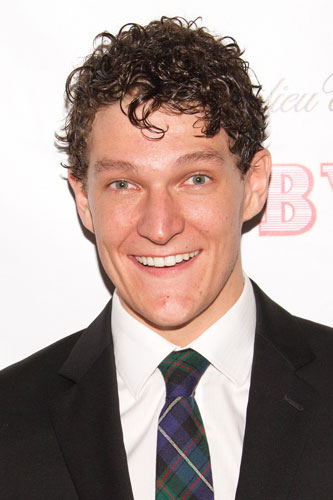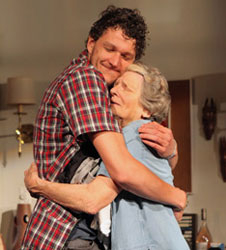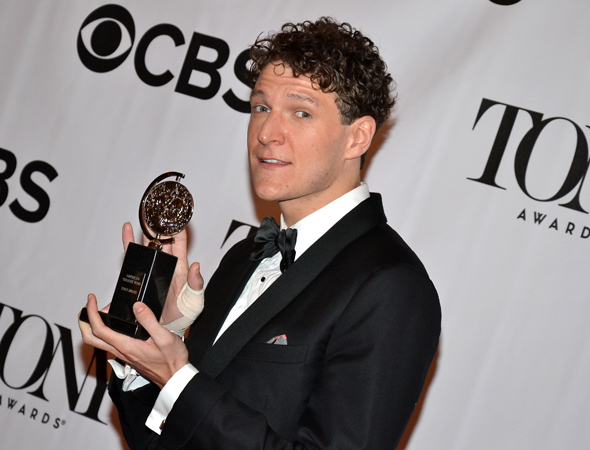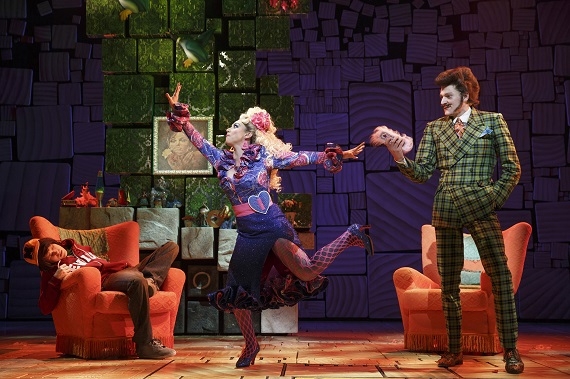Gabriel Ebert Is the Real Deal in Broadway’s Matilda
The Tony winner doffs green hair to chat about traveling from the dirt roads of Colorado to the Broadway stage.

(© courtesy of the production)
Gabriel Ebert is not your average Broadway actor. In fact, he grew up so far removed from modern entertainment sources that his passion and talent for comedy in musical theater is that much more astounding — and refreshing. The Tony Award-winning performer, well-known in New York theater circles for his moving turn in 4000 Miles, continues to sing about the virtues of “the telly” as the protagonist’s repugnant father, Mr. Wormwood, in Matilda at Broadway's Shubert Theatre, despite the fact that he has never had television or the Internet. Ebert grew up in a suburb of Denver, and though he proclaims that he is “not a rustic,” he did use a wood stove and well water, and would have to venture down a dirt road to get into town. Luckily for New Yorkers, that dirt road eventually led him to Dennis Kelly and Tim Minchin’s lovable musical. Ebert chatted with TheaterMania about his continued enthusiasm for Matilda and its fans, his thoughts on the few changes the show has endured, and of course, that award-winning title that now precedes his name.
Were you that little kid dancing around the Thanksgiving dinner table performing for your family?
Probably! I was in choir a lot as a kid, and I did all the plays. I guess my first foray into actually being onstage was doing operas for this choir, but I have always had the please look at me! bug. I’m a younger brother, so that helped.
What was your first memorable role?
My first real big gig was in Gian Carlo Menotti’s opera Amahl and the Night Visitors. I got to play Amahl for a couple of years, which was cool. It’s about the three wise men. They are traveling on their way to meet the baby Jesus, and they stop at this poor woman’s house, and she’s got this child, Amahl, who’s limping with a cane. It’s a beautiful little holiday affair. As a young sapling I was also Winthrop in The Music Man…that was my first taste of getting some laughs and having a solo.
Every child has had an experience with Roald Dahl, whether or not with Matilda. How did you get introduced to his fantasy worlds?

(© Erin Baiano)
When I was a kid I definitely read the ones that had boys as the protagonists, like James and the Giant Peach and Charlie and the Chocolate Factory…I got to see that Gene Wilder film and I thought that was awesome. That was sort of my introduction to the world that I really loved. Funny story: When I was in school it was cool to say, “Oh, that’s the real deal.” Eventually, because I went to an art high school and we were all nerds we used to say, “Oh, that’s the Roald Dahl.” His name became a part of the common vernacular! When I got this job one of my friends said, “Now this literally is the Roald Dahl.”
Your rendering of Mr. Wormwood seems to have more heart than the film and book versions. In the end you don’t hate him! How do you personally contribute to that hint of redemption?
I think for a long time I struggled with why I was even playing this character. I thought, I’m so far from this guy, I’m too young, how can I even do this? Once I got the suit and the wigs on and I started to bounce about, I figured out a way in which I could physically play him. The parts that were the hardest for me were being really cruel to the little girls. I love these little gals, and I’ve become very protective and paternal. So I thought, How can I possibly get down and scream in these little girls' faces all the time? I sort of realized that he’s not necessarily a cruel man; it’s that he’s completely stupid, and he has no better way of going about this. Matilda constantly highlights his stupidity. I guess the way that I try to go about humanizing all this terrible stuff is remembering that he just doesn’t know any better. That somehow walks a fine line because you can be amused by him and actually even feel a little sympathy for him, rather than just finding him completely reprehensible.
How has the production of Matilda changed since it first began? How have the changes affected you?
There have been a lot of cast changes. I’ve never been in a long-running show like this before, so I saw how that provides challenges of its own with longevity, health, stamina, and morale. It’s such a beautiful show, I think we’re holding up really well. We’ve had to make slight changes because of American ears not understanding certain words that we say, or because they’re having trouble understanding the Matildas, so there’ve been some compromises that have had to be made. Some of that depresses me because I think it’s a quintessentially English story and we should keep that intact. I like to believe in an audience working for something. This is an era in which everyone is addicted to screens and is always flipping between an iPhone, iPad, television stations, etc. The attention span is much lower. Matilda actually asks an audience to work, and we've had to slightly modify the amount of work that the audience has to do so that it can be more of an enjoyable theater experience. That’s how it feels from my side. But I understand that the lyrics move very quickly and that they’re very intellectual and complex. We've had to change some things that to me feel integral to what makes the show so special, and that’s tough for me to swallow. But I think the show still holds its heart at the center of all that.

(© David Gordon)
If Mr. Wormwood were to get his own spin-off from Matilda, what would we find him doing with his life?
That’s fascinating! I definitely think there would be plenty of comedy to be mined from Mr. Wormwood at his car dealership. In the book, Roald Dahl elaborates a bunch more about how he pours sawdust into the engines, which makes the cars run better, but it only makes it run for three miles so they’re far enough away. You could have a whole great thing where he tries to teach Michael how to throw. He’d be throwing a cricket ball or a rugby ball, and Michael would have no interest or aptitude for it. Maybe Mr. Wormwood would try to take secret dance lessons to impress his wife. You could have him go to his barber and get a nice haircut. Let’s make this idea happen! (laughs)
Do you ever audition for television or film projects?
I just made my first film, and that was really exciting. I got to sort of taste that world of acting in front of a camera. It’s called Jane Wants a Boyfriend, an independent film starring Eliza Dushku. I play the boyfriend. That’s right, I get to be the guy! I think it’s a beautiful piece. I do see more acting on camera in my future. I love that kind of stuff. When I was growing up I loved Jim Carrey and Harpo Marx. I would watch them and I go, “I want to do that.” There’s a way in film where you can give a performance and put your whole heart into it and even borderline sacrifice your life, and it’s captured forever. You can make a real statement with that.
After winning the Tony Award for Billy Elliot, Gregory Jbara jokingly said he was going to change his voicemail to “You have reached the voicemail of Tony Award winner Gregory Jbara…” He said that that seemed to be his new name. How has having the title of Tony Winner affected your life?
I’ve just had to get back to work and do Matilda, and prove to myself and the theatergoing public that the award was given to the right guy. I try to be the same guy that I was on June 8th as opposed to on June 9th. It definitely gets my toe in the door. In the end I feel like I still have to prove my mettle, which I actually like and hope to do, but I don’t know if I’ll quite see the effects of its worth in the industry until after I’m out of Matilda.
If you were to start a trend and could play any character in yet another book, who would you want to play?
This probably changes. When I was eighteen I really wanted to play Holden Caulfield from The Catcher in the Rye. And then I read 1984 and I really wanted to play Winston Smith. The only problem with Holden and Winston is that the entire book takes place inside of their heads, and you can’t really do that on camera or on stage. There’s this book called The Art of Fielding by Chad Harbach. It’s about a kid who goes to college to play baseball. I want to play the kid, Henry Skrimshander. I might be a little long in the tooth now, sadly. It’s an incredible book. In another life I would’ve wanted to be a major league shortstop and that’s what this guy gets to do. So if I could be an actor and pretend that I’m a major league shortstop, that’s the dream. It doesn’t get better than that.

(© Joan Marcus)









